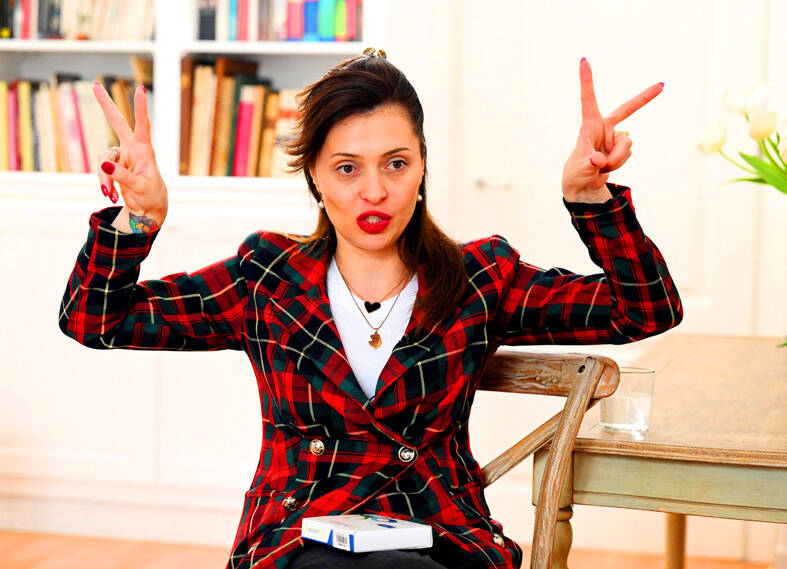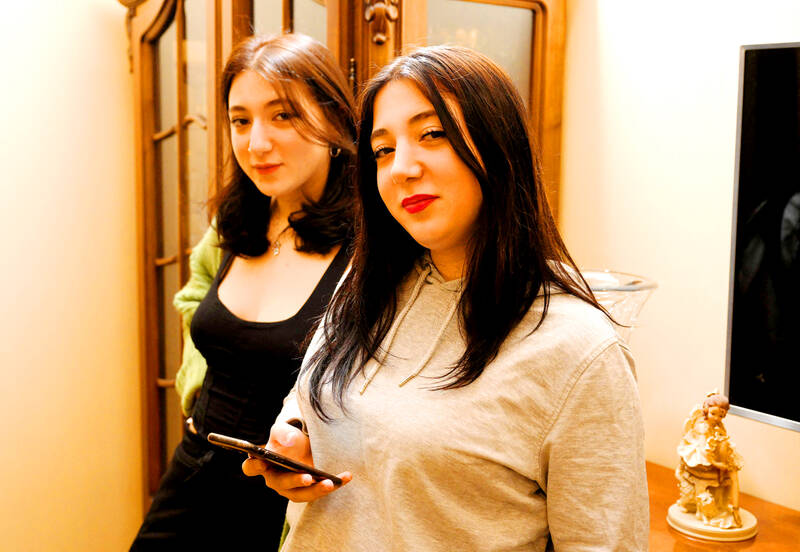Georgian student Elene Deisadze was browsing TikTok in 2022 when she stumbled across the profile of a girl, Anna Panchulidze, who looked exactly like her. Months later, after chatting and becoming friends, they both separately learned they were adopted, and last year decided to take a DNA test. It revealed they were not only related, but identical twins.
“I had a happy childhood, but now my entire past felt like a deception,” said Anna, an English student at university.
Far from an innocent case of separation at birth, the sisters are among tens of thousands of Georgian children who were illegally sold in a decades-long baby trafficking scandal. The scheme, uncovered by journalists and families searching for lost relatives, saw babies stolen from their mothers — many of whom were told they had died — and then sold to adoptive parents in Georgia and abroad.

Photo: AFP
Journalists have found that the illegal adoptions took place over more than 50 years, orchestrated by a network of maternity hospitals, nurseries and adoption agencies that colluded to take the children from their parents, falsify birth records, and place them with new families in exchange for cash.
Elene and Anna, now 19, began unraveling their hidden past two years ago.
“We became friends without suspecting we might be sisters, but both of us felt there was some special bond between us,” said Elene, a psychology student.

Photo: AFP
Last summer, both of their parents independently told the girls they had been adopted — revelations they had long planned to make. It was then that the pair decided to take the genetic test that would reveal they were identical twins.
“I struggled to process the information, to accept the new reality — the people who had raised me for 18 years are not my parents,” Anna said.
“But I feel no anger whatsoever, only immense gratitude to the people who raised me, and joy at finding my flesh and blood,” she added.
The test for Elene and Anna was arranged with the help of Georgian journalist Tamuna Museridze, who runs a Facebook group dedicated to reuniting babies stolen from their parents. It has more than 200,000 members — including mothers who were told by hospital staff that their babies had died shortly after being born, but then discovered years later they might be alive.
Museridze set up the group in 2021 in a bid to find her own family after learning she had been adopted. She soon uncovered the mass baby-selling operation.
“Mothers were told their babies had died shortly after birth and were buried at a hospital cemetery,” Museridze said. “In fact, hospitals had no cemeteries, and babies were being secretly whisked away and sold to adoptive parents.”
The new parents were often unaware the adoptions were illegal and told fabricated stories about the circumstances.
“Some people, however, consciously chose to circumvent the law and buy a baby” to avoid decade-long waiting lists, Museridze said.
She said she has evidence that at least 120,000 babies “were stolen from their parents and sold” between 1950 and 2006, when anti-trafficking measures by reformist former Georgian president Mikheil Saakashvili eventually quashed the scheme.
In Georgia, new parents would pay the equivalent of many months’ salary to arrange the adoption, while babies trafficked abroad were sold for up to US$30,000, Museridze said.
Elene’s adoptive mother, Lia Korkotadze, decided with her husband to adopt after learning they could not have children a year into their marriage.
“But adopting from an orphanage seemed virtually impossible due to incredibly long waiting lists,” the 61-year-old economist said.
In 2005, an acquaintance told her about a six-month-old baby available for adoption from a local hospital — for a fee.
Korkotadze said she “realized that was my chance,” and agreed.
“They brought Elene right to my house,” Korkotadze said, never suspecting there was “anything illegal.”
“It took months of excruciating bureaucratic delays to formalize the adoption through court,” she said.
The tale of Anna and Elene mirrors that of another set of twin sisters — Anna Sartania and Tako Khvitia.
They were separated at birth and sold to different parents, managing to reunite years later after finding each other on social media.
More than 800 families have been reunited thanks to Museridze’s Facebook group.
Successive Georgian governments have made multiple attempts to investigate the scheme and have made a handful of arrests over the last 20 years.
Georgian Ministry of Internal Affairs spokesman Tato Kuchava said that an “investigation is underway” into Museridze’s revelations, but declined to provide further details.
Georgian Prime Minister Irakli Kobakhidze last week in the Georgian parliament said that Tbilisi is among the world leaders in combating trafficking.
However, Museridze said the state’s response has been lacking.
“The government did nothing tangible to help our efforts,” she added.

Swedish campaigner Greta Thunberg was deported from Israel yesterday, the Israeli Ministry of Foreign Affairs said, the day after the Israeli navy prevented her and a group of fellow pro-Palestinian activists from sailing to Gaza. Thunberg, 22, was put on a flight to France, the ministry said, adding that she would travel on to Sweden from there. Three other people who had been aboard the charity vessel also agreed to immediate repatriation. Eight other crew members are contesting their deportation order, Israeli rights group Adalah, which advised them, said in a statement. They are being held at a detention center ahead of a

A Chinese scientist was arrested while arriving in the US at Detroit airport, the second case in days involving the alleged smuggling of biological material, authorities said on Monday. The scientist is accused of shipping biological material months ago to staff at a laboratory at the University of Michigan. The FBI, in a court filing, described it as material related to certain worms and requires a government permit. “The guidelines for importing biological materials into the US for research purposes are stringent, but clear, and actions like this undermine the legitimate work of other visiting scholars,” said John Nowak, who leads field

‘THE RED LINE’: Colombian President Gustavo Petro promised a thorough probe into the attack on the senator, who had announced his presidential bid in March Colombian Senator Miguel Uribe Turbay, a possible candidate in the country’s presidential election next year, was shot and wounded at a campaign rally in Bogota on Saturday, authorities said. His conservative Democratic Center party released a statement calling it “an unacceptable act of violence.” The attack took place in a park in the Fontibon neighborhood when armed assailants shot him from behind, said the right-wing Democratic Center, which was the party of former Colombian president Alvaro Uribe. The men are not related. Images circulating on social media showed Uribe Turbay, 39, covered in blood being held by several people. The Santa Fe Foundation

NUCLEAR WARNING: Elites are carelessly fomenting fear and tensions between nuclear powers, perhaps because they have access to shelters, Tulsi Gabbard said After a trip to Hiroshima, US Director of National Intelligence Tulsi Gabbard on Tuesday warned that “warmongers” were pushing the world to the brink of nuclear war. Gabbard did not specify her concerns. Gabbard posted on social media a video of grisly footage from the world’s first nuclear attack and of her staring reflectively at the Hiroshima Peace Memorial. On Aug. 6, 1945, the US obliterated Hiroshima, killing 140,000 people in the explosion and by the end of the year from the uranium bomb’s effects. Three days later, a US plane dropped a plutonium bomb on Nagasaki, leaving abut 74,000 people dead by the